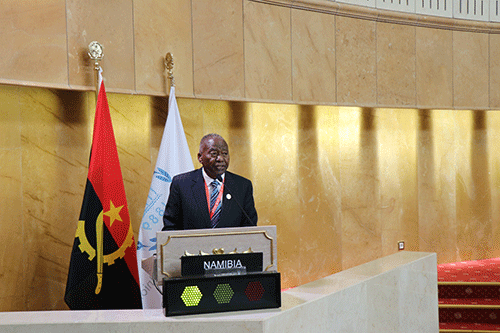Namibia remains one of the most unequal countries in the world, with a Gini score reported at 59.1 in 2015. The Gini Coefficient is also known as the Gini index, which is the statistical measure used for the distribution of income among the population of a country.
In 2021, around 64.5% of the Namibian population was projected to live on less than US$5.50 daily (N$83.42). This figure was stated this week by Vera Songwe, United Nations Under-Secretary-General and Executive Secretary of the Economic Commission for Africa, while delivering a public lecture in Windhoek.
“The Covid-19 pandemic is having an unprecedented impact on Namibia’s economy, and has exacerbated pre-existing structural challenges. Progress on structural reforms will be required to raise Namibia’s growth potential and fight income inequality,” she explained.
She added that the pandemic has further exacerbated Namibia’s disparities in economic opportunities and access to services. Songwe said many African states are facing financing challenges, and Namibia is no exception. According to her, declining foreign direct investment (FDI) and trade deficits limit the financing needed for development.
She added: “One of the dominant financing challenges is the mounting debt situation, which absorbs further financing. Africa is facing a higher debt risk. The continent’s debt-to-GDP ratio rose by almost 70% from 2014 to 2021, and external debt is mounting. The debt service increased from 4.3% of GDP into 7% of GDP. Namibia is no exception”.
Furthermore, the Bank of Namibia yesterday hosted a seminar with the theme ‘Mapping Namibia’s Post-Covid Economic Recovery’, where central bank governor Johannes !Gawaxab said monetary policy alone is not enough to revive the economy.
“Though monetary policy has provided substantial support to the economy, the pace of recovery will depend on factors outside the bank’s control such as improved sovereign debt sustainability, structural reforms and the implementation of an accelerated growth and recovery strategy, as well as strong private sector, domestic and foreign investments and risk- taking,” he stated.
!Gawaxab said post-Covid-19 economic recovery faces a number of significant hurdles in Namibia. He added that apart from the need to address electricity and digital infrastructure, urgent attention has to be given to creating policy certainty, ensuring professional service delivery and diligent execution of policy as well as addressing accountability issues.
“All of this must be accomplished while the fiscal situation is very tight, and Namibia really has to do more with less. The potential to overcome supply-side constraints, improve productivity, potential growth and job creation can be unlocked through private sector-led activities. To this end, impetus must be given to the implementation of the various recommendations and objectives on the matter,” he noted.
Sharing his thoughts on how Namibia can jumpstart the economy, the governor stated that there is a need for private sector investments in high labour-absorptive sectors such as agriculture as a strategy for short to medium-term interventions.
Outlining the other interventions, he said Namibia needs to improve domestic resources’ mobilisation and specifically tax compliance, promoting and attracting foreign direct investment through incentives in exchange for jobs and export earnings, while reforming, strengthening and optimising state-owned enterprises, especially commercial SOEs.
“There is a need to demonstrate, in a most practical way, government efforts to move towards privatisation, and the outsourcing and liquidation of non-performing SOEs that continue to be a drag on the budget,” explained !Gawaxab.
Furthermore, structural reforms are needed to enable growth, and this includes leveraging assets and developing self-sustaining economies in municipalities as well as town and village councils. -mndjavera@nepc.com.na



